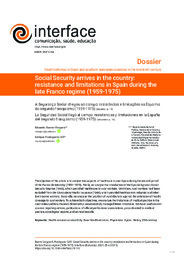Please use this identifier to cite or link to this item:
https://hdl.handle.net/11000/33086Full metadata record
| DC Field | Value | Language |
|---|---|---|
| dc.contributor.author | Bueno Vergara, Eduardo | - |
| dc.contributor.author | Perdiguero-Gil, Enrique | - |
| dc.contributor.other | Departamentos de la UMH::Salud Pública, Historia de la Ciencia y Ginecología | es_ES |
| dc.date.accessioned | 2024-09-13T08:26:12Z | - |
| dc.date.available | 2024-09-13T08:26:12Z | - |
| dc.date.created | 2021 | - |
| dc.identifier.citation | Interface (Botucatu). 2021; 25: e210112 | es_ES |
| dc.identifier.issn | 1807-5762 | - |
| dc.identifier.uri | https://hdl.handle.net/11000/33086 | - |
| dc.description.abstract | The objective of the article is to analyze two aspects of healthcare in rural Spain during the second period of the Franco dictatorship (1959–1975). Firstly, we analyze the introduction of the Special Agrarian Social Security Regime (1966), which provided healthcare to rural workers. Until then, rural workers had been excluded from the Compulsory Health Insurance (1944), which provided healthcare to industrial and other low-income workers. Secondly, we analyze the position of rural doctors against the extension of health coverage to rural workers. To achieve both objectives, we analyze the limitations of medical practice in the rural milieu and how Franco’s dictatorship unsuccessfully managed these limitations. We have used several sources: legal regulations, publications of official professional associations, press devoted to medical practice, sociological reports, and archival records El objetivo del artículo es analizar dos aspectos de la asistencia sanitaria en el medio rural español durante el segundo periodo de la dictadura franquista (1959-1975). Primero analizamos la implantación del Régimen Especial Agrario de la Seguridad Social (1966), que proporcionó asistencia sanitaria a los trabajadores del campo. Hasta entonces, habían sido excluidos del Seguro Obligatorio de Enfermedad (1944), destinado a obreros industriales y otros asalariados con bajos ingresos. En segundo lugar, analizamos la oposición de los médicos rurales a la ampliación de la cobertura sanitaria a los trabajadores agrícolas. Para lograr ambos objetivos analizamos las limitaciones del ejercicio médico en el ámbito rural y cómo la Dictadura intentó solucionar infructuosamente estos problemas. Las fuentes empleadas han sido: disposiciones legislativas, publicaciones de los colegios profesionales oficiales, prensa dedicada a discutir problemas del ejercicio médico, informes sociológicos y documentación de archivo. | es_ES |
| dc.format | application/pdf | es_ES |
| dc.format.extent | 14 | es_ES |
| dc.language.iso | eng | es_ES |
| dc.rights | info:eu-repo/semantics/openAccess | es_ES |
| dc.rights | Attribution-NonCommercial-NoDerivatives 4.0 Internacional | * |
| dc.rights.uri | http://creativecommons.org/licenses/by-nc-nd/4.0/ | * |
| dc.subject | Health services accessibility | es_ES |
| dc.subject | Rural health services | es_ES |
| dc.subject | Physicians | es_ES |
| dc.subject | Spain | es_ES |
| dc.subject | History 20th century | es_ES |
| dc.subject.other | CDU::6 - Ciencias aplicadas::61 - Medicina | es_ES |
| dc.subject.other | CDU::9 - Geografía e historia::93 - Historia. Ciencias auxiliares de la historia. Archivista. Numismática. Paleografía. Diplomática | es_ES |
| dc.title | Social Security arrives in the country resistance and limitations in Spain during the late Franco regime (1959-1975) | es_ES |
| dc.type | info:eu-repo/semantics/article | es_ES |
| dc.relation.publisherversion | https://doi.org/10.1590/interface.210112 | es_ES |

View/Open:
Social Security arrives in the country.pdf
363,97 kB
Adobe PDF
Share:
.png)
